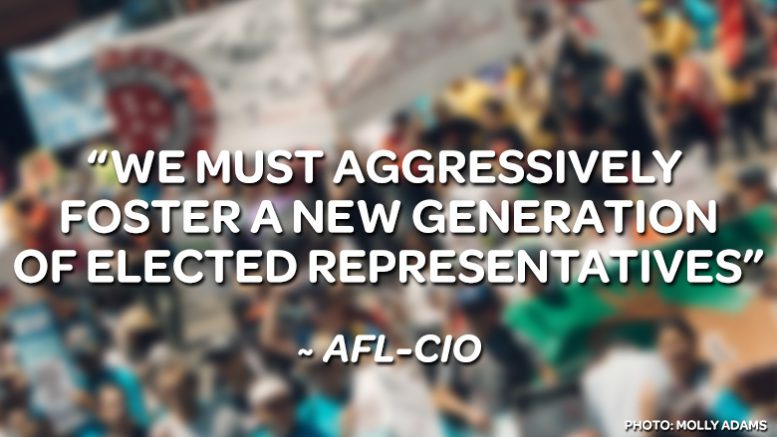By Chris Robinson
Delegates to the National Convention of the American Federation of Labor and Congress of Industrial Organizations (AFL-CIO) passed two significant resolutions, which will allow local unions to encourage their members to vote for independent political candidates, including those from the Green Party. The meeting of more than 1,000 union members took place during the last week of October in St. Louis, MO.
In the past, labor unions have, with few exceptions, endorsed electoral candidates from the two corporate parties. These politicians kowtow to the interests of corporations and the wealthy. Because of the expense of electoral campaigns, candidates usually rely on funding from corporate PACs and upper-income donors. This has resulted in electoral contests in which candidates vie for approval of the wealthy without speaking to the needs of working people or the planet.
Perhaps as a result of corrupt primary elections in 2016, the AFL-CIO now appears to be standing up on its hind legs. Significantly, AFL-CIO Resolution #2, was entitled, “An Independent Political Voice.” While never explicitly mentioning the Democratic Party, this resolution very clearly states, “The time has passed when we can passively settle for the lesser of two evils.”
Convention delegates also passed AFL-CIO Resolution #48, entitled, “Exploring New Directions for Labor in Electoral Politics.” In the words of the resolution, it was based on the observation that “whether the candidates elected are from the Republican or Democratic Party, the interests of Wall Street have been protected and advanced, while the interests of labor and working people have generally been set back.”
This resolution assures continued support for politicians who have proven to be “friends and allies of labor.” Unions will continue to work for politicians who have voted for issues important to working people. These issues are enumerated as “good jobs, health care, safe working conditions, secure and dignified retirements, protecting and enhancing collective bargaining and the rights of workers to organize, protecting the right to vote, access to affordable education and housing, good public education and public services, an end to trade deals that cost millions of jobs, and investments in infrastructure and the environment leading to the creation of millions of jobs.”
The delegates, therefore, resolved that the AFL-CIO “studies the viability of independent and third-party politics; and explores other reasonable means of advancing the interests of labor in electoral politics.” The future will determine whether the national AFL-CIO and its local unions will take the next step and act vigorously to fulfill the wishes of its membership. The door is now open for third parties like the Green Party to seek endorsements and support from organized labor.
The author is a member of United Food and Commercial Workers Local #1776 and Membership Secretary of the Green Party of Philadelphia, PA.
